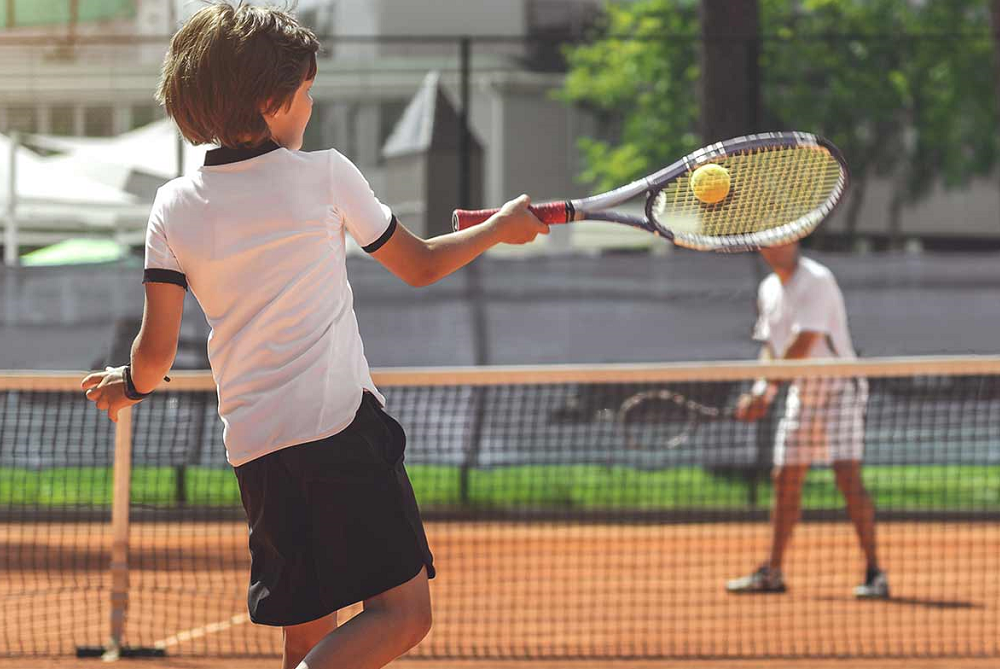
Can A Sports Physical Replace A Wellness Exam?
August 8, 2023
Before your child can take the field or hit the courts, their doctor must give the all-clear for them to play.
 Since the sports physical is a pre-requisite to organized activity, you may be tempted to skip your child’s annual well-visit. After all, do you really need to go to the doctor’s office twice if they’re healthy enough to play sports?
Since the sports physical is a pre-requisite to organized activity, you may be tempted to skip your child’s annual well-visit. After all, do you really need to go to the doctor’s office twice if they’re healthy enough to play sports?
Of course, the answer is yes! Each type of visit to your pediatrician serves a different purpose, and one cannot replace the other.
Shoshana Gordon, D.O., a pediatrician for Henry Ford Health, explains the differences between the sports physical and regular wellness examination.
What Happens at a Wellness Exam
An annual wellness exam is a comprehensive visit that allows your child’s pediatrician to monitor all aspects of your child’s development. These appointments can vary quite a bit, depending on your child’s age.
“Your child grows so much early in life that we need to see them several times before their first birthday,” says Dr. Gordon. “As they get older, the conversations at these appointments evolve and expand to include topics like mental health and what to expect from puberty.”
Generally, many aspects of your child’s wellness exam will stay the same over time. Regardless of age, this appointment will include:
- Checking vitals (heart rate, blood pressure)
- A physical exam (to monitor physical growth)
- Discussing developmental milestones
- Developmental and emotional/behavioral screenings
- Conversations about nutrition and any physical activities your child is involved in
- Conversations about how your child is getting on at school
- An opportunity to discuss questions or concerns you or your child may have
One crucial part of the wellness exam is immunization. This appointment is the best time for you to talk with your child’s pediatrician to make sure that your child is up to date on necessary vaccines.
Additionally, wellness exams are the best way for you and your child to develop a relationship with their pediatrician. When you only take your child to the doctor when they are sick, it is harder for your pediatrician to set a baseline for their health.
“Regular wellness visits allow you and your child to get comfortable with asking your doctor questions,” says Dr. Gordon. “Once we develop a good patient-provider relationship, your child’s pediatrician will have an easier time recognizing when your child isn’t feeling like themselves and can better offer alternate approaches to care that best suit your child’s unique needs."
What Happens at a Sports Physical
Sports physicals are used to determine if your child is healthy enough to participate in organized sports. During this appointment, your child’s doctor will screen them for different sports-specific health concerns. They will be evaluating several things including:
- Heart function
- Lung function
- Mobility
- Reflexes
- Endurance
“During a sports physical, we’ll look at both your child’s and your family’s health history to make sure there aren’t any indicators that could impact your child’s ability to play,” says Dr. Gordon. “For example, if your child had COVID or if you have a family history of cardiovascular complications, additional tests may be necessary to make sure this isn’t affecting your child’s health.”
The biggest difference from a wellness exam? Sports physicals don’t include developmental screeners that are essential to your child’s growth.
“At the end of the day, a sports physical cannot take the place of your child’s annual wellness exam,” says Dr. Gordon. “However, when you go for your child’s wellness exam, talk to your child’s pediatrician about including a sports physical as part of the appointment.”
In addition to the developmental, social and emotional evaluations that take place at your child’s annual wellness exam, this is the best time for you and your child to get to know your pediatrician. Establishing yourself with your child’s doctor will make it easier to treat and care for your child as they continue to grow.
To find a pediatrician or make an appointment online, visit henryford.com or call 1-800-436-7936.
Dr. Shoshana Gordon is a pediatrician who sees patients at Henry Ford Medical Center-Royal Oak and Henry Ford Medical Center-Sterling Heights.

5 Strategies To Improve Range Of Motion
March 6, 2024
When it comes to health and fitness, regular exercise and strength training get the most attention. But it turns out that improving your range of motion may pay greater dividends, particularly over the long haul.
“All kinds of things can impact our range of motion,” says Jennifer Burnham, an athletic trainer at Henry Ford Health. “As we age, our joints become less pliable, but any kind of surgery or injury can also impact our range of motion. And if you're somebody who sits at a desk all day long, that can affect your range of motion as well.”
Why Is Improving Flexibility Important?
Staying active with regular cardiovascular exercise and strength training is a great way to maintain your overall physical health. But it’s important to remember that flexibility exercises come with plenty of perks, too, including:
- Preventing injury
- Staving off arthritis by lubricating joints and tissues
- Improving posture and balance
"Unfortunately, if you have limited range of motion, you may perform tasks incorrectly, causing other muscles and joints to overcompensate for the lack of mobility,” Burnham says. “Over time, that compensation mechanism can increase the risk of injury.”
To complicate matters, our lifestyles often don’t support our range of motion goals. Many of us spend most of our days sitting at a desk or hunched over a screen. And when we’re not sitting still, most of us are slouching.
What Are Some Ways To Improve Range Of Motion?
You don’t have to be able to twist your limbs into a pretzel to achieve full range of motion. Instead, try to improve on your current level of flexibility with these five simple strategies:
- Pay attention to timing. If you’re not ready to add a stretching day to your workout regimen, consider adding a set of flexibility exercises at the end of every session. Pre-workout stretching is helpful, too, but stretching when your muscles are warm is a more effective way to stave off injuries.
- Focus on mobility and stability. Even if you can do the splits or touch your toes to the back of your head, you won’t be able to hold the position if you don’t also have strong core muscles. “Most people do stabilizing exercises such as strength training and lifting weights without paying much attention to mobilizing activities like stretching and yoga,” Burnham says. “But you really need to do both stabilizing and flexibility exercises to get an effective workout.”
- Do a mix of dynamic and static stretches. Two types of stretches can help you gain an edge when it comes to improving range of motion: Dynamic (an active type of stretching where you’re moving within your range of motion) and static stretching (where you hold a stretch). Dynamic stretching with arm and head circles, side stretches, and hip circles before exercise is a good way to warm up cool muscles and help lubricate the joints. With static stretching such as touching your toes to stretch your hamstrings, the goal is to hold a position for 30 seconds or more. Static stretches are often best performed after a workout when your muscles are warm.
- Try foam rolling. Foam rollers act almost like a rolling pin to smooth out tight muscles. Used correctly, they can help improve range of motion — and release stress and tension. You can use foam rollers to prime your body for exercise, or to recover after a workout.
- Aim for balance. If one part of your body is super flexible, focus on increasing range of motion in the opposing muscle group. “So, for example, if your hamstrings are very flexible, make sure to target your quadriceps with flexibility exercises,” Burnham says. “The goal is to make sure you’re aiming for balancing in your body.”
While stretching is an important way to achieve and maintain balance, flexibility and range of motion, it isn’t always intuitive. Not sure where to begin? Consider meeting with a personal trainer or athletic trainer to help you devise a program.
“Watching YouTube videos can be helpful, but if you’ve never done flexibility exercises before, you could overstretch your muscles or find yourself in an incorrect position to stretch,” Burnham says. “And yes, you can create bodily injury by overstretching.”
To find a sports medicine provider at Henry Ford Health, visit henryford.com/sportsmedicine or call 313-651-1969.
Reviewed by Jennifer Burnham, MS, AT, ATC, CSCS, a certified athletic trainer at the Henry Ford Center for Athletic Medicine.

